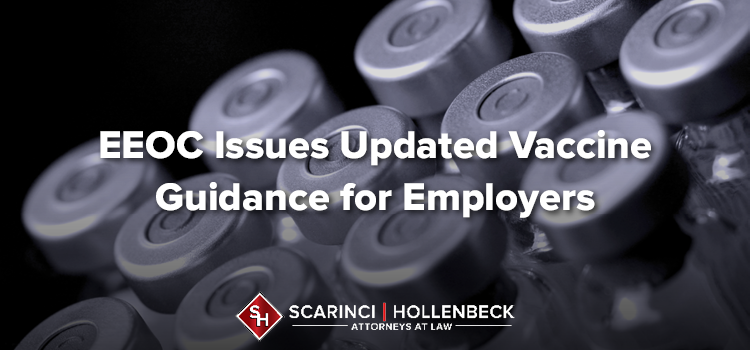
The EEOC recently updated its guidance regarding COVID-19 vaccination…
The Equal Employment Opportunity Commission (EEOC) recently updated its guidance regarding COVID-19 vaccination. The latest update addresses religious objections to employer COVID-19 vaccine requirements and how they interact with federal labor laws.
“This update provides employers, employees, and applicants with important assistance when navigating vaccine-related religious accommodation requests,” EEOC Chair Charlotte A. Burrows said in a press statement. “Title VII requires employers to accommodate employees’ sincerely held religious beliefs, practices, and observances absent undue hardship. This update will help safeguard that fundamental right as employers seek to protect workers and the public from the unique threat of COVID-19.”
EEOC Guidance on COVID-19 Vaccination
Since the beginning of the pandemic, the EEOC has regularly updated its publication, “What You Should Know About COVID-19 and the ADA, the Rehabilitation Act, and Other EEO Laws.” As COVID-19 vaccines became widely available, the EEOC added guidance addressing legal requirements under the Americans with Disabilities Act (ADA), the Genetic Information Nondiscrimination Act (GINA), and Title VII of the Civil Rights Act, which employers should take into account before establishing a mandatory vaccine requirement and/or administering the vaccine in the workplace.
As set forth in the EEOC guidance, if an employer is on notice that an employee’s sincerely held religious belief, practice, or observance prevents the employee from receiving the vaccination, the employer must provide a reasonable accommodation unless it would pose an undue hardship under Title VII. The term “undue hardship” is defined as having more than a de minimis cost or burden on the employer. As the EEOC notes, its existing guidance advises that because the definition of religion is broad and protects beliefs, practices, and observances with which the employer may be unfamiliar, the employer should ordinarily assume that an employee’s request for religious accommodation is based on a sincerely held religious belief. If, however, an employee requests a religious accommodation, and an employer has an objective basis for questioning either the religious nature or the sincerity of a particular belief, practice, or observance, the employer would be justified in requesting additional supporting information.
As highlighted by the EEOC, the lack of a reasonable accommodation does not immediately justify termination. “If an employee cannot get vaccinated for COVID-19 because of a disability or sincerely held religious belief, practice, or observance, and there is no reasonable accommodation possible, then it would be lawful for the employer to exclude the employee from the workplace,” the guidance states. “This does not mean the employer may automatically terminate the worker. Employers will need to determine if any other rights apply under the EEO laws or other federal, state, and local authorities.” For example, if an employer excludes an employee based on an inability to accommodate a request to be exempt from a vaccination requirement, the employee may be entitled to accommodations such as performing the current position remotely.
Addressing Religious Objections to Vaccination
On October 25, 2021, the EEOC provided specific guidance on how employers should respond to religious objections to mandatory vaccination policies. Below are several key points:
- Notification of Religious Objection: Employees and applicants must inform their employers if they seek an exception to an employer’s COVID-19 vaccine requirement due to a sincerely held religious belief, practice, or observance. The EEOC advises that while employees do not need to use any “magic words,” such as “religious accommodation” or “Title VII,” they need to notify the employer that there is a conflict between their sincerely held religious beliefs and the employer’s COVID-19 vaccination requirement. According to the EEOC, the same principles apply if employees have a religious conflict with getting a particular vaccine and wish to wait until an alternative version or specific brand of COVID-19 vaccine is available.
- Sincerely Held Religious Beliefs: The EEOC advises that employers should generally assume that a request for religious accommodation is based on sincerely held religious beliefs. However, its guidance also states that if an employer has an objective basis for questioning either the religious nature or the sincerity of a particular belief, the employer would be justified in making a limited factual inquiry and seeking additional supporting information. The guidance also reminds employers that the definition of “religion” under Title VII protects nontraditional religious beliefs that may be unfamiliar. “At the same time, Title VII does not protect social, political, or economic views, or personal preferences,” the EEOC states. “Thus, objections to COVID-19 vaccination that are based on social, political, or personal preferences, or on nonreligious concerns about the possible effects of the vaccine, do not qualify as ‘religious beliefs’ under Title VII.”
- Undue Hardship: Employers that demonstrate “undue hardship” are not required to accommodate an employee’s request for a religious accommodation. As the guidance explains, the U.S. Supreme Court has held that requiring an employer to bear more than a “de minimis,” or a minimal, cost to accommodate an employee’s religious belief is an undue hardship. “Costs to be considered include not only direct monetary costs but also the burden on the conduct of the employer’s business – including, in this instance, the risk of the spread of COVID-19 to other employees or to the public,” the guidance states. Courts have found Title VII hardship in instances where religious accommodation impairs workplace safety, diminishes efficiency in other jobs, or causes coworkers to carry the accommodated employee’s share of burdensome or hazardous work.
Key Takeaway
There are a number of legal considerations that employers must address when responding to employees’ religious objections to COVID-19 vaccination requirements. Given the potential legal risks, we encourage all private and public employers to work with experienced counsel when drafting and implementing COVID-19 vaccination policies.
If you have questions, please contact us
If you have any questions or need legal guidance, please contact John Geppert or a member of Scarinci Hollenbeck’s Government Law Group at 201-896-4100.
